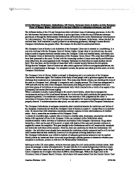How effective is the scrutiny role of TDs?
Theoretically, TDs in the Dail have a number of ways which they are able to scrutinize the government, the three main ways in which TDs scrutinize are through Parliamentary questions, committees and debates.
Parliamentary questions take place every Tuesday, Wednesday, Thursday and they allow TDs to directly scrutinize government ministers and the Taoiseach. The Taoiseach’s questions take place every Tuesday and Wednesday, although TDs are limited to 2 Oral questions per day and each Oral question should be given four days in advance which is stacked in the Ministers and Taoiseach’s favour as they are able to do a decent amount of research before answering the question. For example the Taoiseach alone has a department of 300 full time staff members. Written questions must also be given in advance, although they have to be given 3 days before the question is asked in the Dail and there is no limit to the amount of written questions a TD can ask the Government. However a major disadvantage of parliamentary questions is due to the fact that the questions are shared about between the political parties according to their strength, therefore the larger party will be given more questions than the smaller parties and this will cause the scrutinizing function of parliamentary questions to be less effective. However supplementary questions allow TDs to scrutinize the government effectively and embarrass them at the same time. Overall parliamentary questions are ineffective when it comes to scrutinizing the government and they have been described as “scripted, predictable, soulless affair” by The Irish Times.







